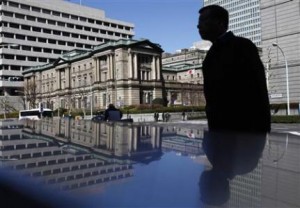Last weekend we convened a quite exciting conference on “The Changing Politics of Central Banks” sponsored by the Cornell International Law Journal (symposium website). The focus on central banks as political actors is clearly timely given the growing awareness of the public of the distributive effects of monetary policy and also the debates taking place in many countries around the world about the proper scope of independence for central banks. Yet we lack a sufficiently rich vocabulary for talking about this politics. Moreover, this is one of those interesting places where traditional right-left divides do not apply: what do we make of Paul Krugman’s embrace of Abenomics, for example?
The perspectives of the conference participants–academics and central bankers, mainly–varied considerably. Keynote speaker Dan Tarullo pointed out that while independence make sense in the realm of monetary policy there is no reason for independence with respect to the central bank’s regulatory role, since in that space it acts very much like other kinds of administrative agencies which are subject to various forms of oversight (press coverage of Dan Tarullo’s remark: 1, 2, 3, 4). Peter Lindseth, an administrative law and EU law specialist, spoke of the need for precisely this form of administrative oversight. Anna Gelpern pointed out that given what she called “the big blur” of monetary and fiscal policy, we need to begin to reeducate the public about what political legitimacy for central banks should look like. Katharina Pistor argued that the focus on central bank legitimacy was not the entirely right question–that we should be asking “what kind of global financial system do we want”–because as long as we have this system, central banks can do nothing other than what they are currently doing. Bob Hockett argued for an international central bank that would better address the needs of the global financial system than can a network of national central banks. I took the opposite approach to Bob to the same problem: I suggested that the field of conflict of laws, with its rules for determining “who is in charge” in any particular situation, could better coordinate regulation transnationally than can global institutions. Doug Holmes presented the findings of his extensive research on how central banks communicate with their various publics and constituencies in order to demonstrate that central banks are in fact more in touch, and more accountable, than the formal institutional structure would suggest.
What was resolved at the conference? I think we clarified a few points:
- Central banks are indeed political institutions that can and should be analyzed as such.
- Given that the genie is out of the bottle and there is indeed a “big blur” between monetary and fiscal policy, we need new ways of talking about the political accountability of central banks.
- There are nevertheless interesting variations in this politics from one state and market to the next, and even in any one context, the processes of accountability are far more complex and multivocal than they appear at first site.
- All of this impacts on the ability of central banks to cooperate in order to forestall future financial crises.
Sounds like a mandate for more research. Stay tuned!

